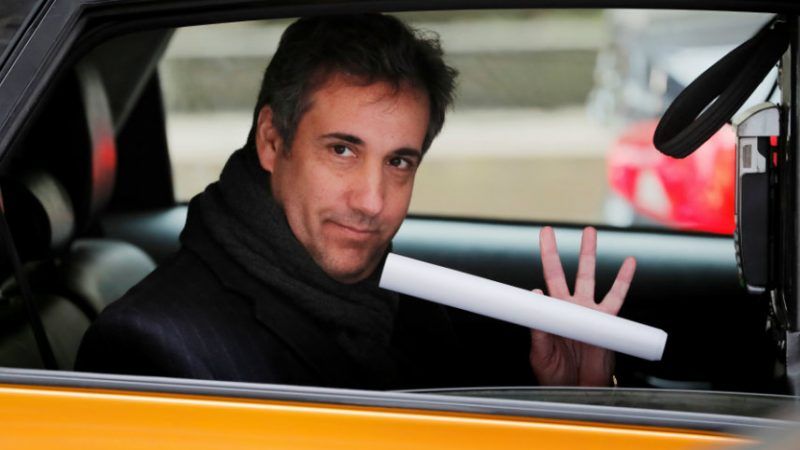Rabbinical Law, The 5th Amendment, and Michael Cohen's Guilty Plea
The same civil liberties that protect accused communists or street criminals may also protect the president or his lawyer. They protect us all.

The guilty plea of a former lawyer for the Trump Organization, Michael Cohen, was reportedly motivated in part by Cohen's 83-year-old father, who supposedly told his son that he didn't "survive the Holocaust to have his name sullied by Mr. Trump."
It's unclear whether Michael Cohen or his father are aware of it, but Jewish law that long predates the Holocaust forbids the use of guilty pleas. That tradition may provide some useful perspective on Michael Cohen's confession and on the American criminal justice system that extracted it.
Don't just take it from me. No fewer than three U.S. Supreme Court justices have publicly cited the Jewish prohibition on self-incrimination. All three of those justices were noted liberals, which may be something to consider for those on the left who have been cheering Cohen's guilty plea as a defeat for President Trump.
Chief Justice Earl Warren, in his landmark opinion in the 1966 case Miranda v. Arizona, wrote, "We sometimes forget how long it has taken to establish the privilege against self-incrimination, the sources from which it came, and the fervor with which it was defended. Its roots go back into ancient times." Warren's footnote for that sentence went to the Jewish philosopher Maimonides, who lived from 1135 to 1204: "To sum up the matter, the principle that no man is to be declared guilty on his own admission is a divine decree."
Justice William Douglas, in his 1967 opinion in Garrity v. New Jersey, recognized that police officers, too, were protected by the Fifth Amendment right against being forced to testify against themselves in a criminal proceeding. Douglas quoted a journal article by Rabbi Norman Lamm, who would later become president of Yeshiva University, titled, "The Fifth Amendment And Its Equivalent In Jewish Law." Lamm, as quoted by Douglas, wrote that Jewish law "does not permit self-incriminating testimony. It is inadmissible, even if voluntarily offered."
Justice Arthur Goldberg, in his introduction to Aaron Kirschenbaum's 1970 book "Self-Incrimination In Jewish Law," wrote, "We have something to learn from this ancient tradition, particularly now, when our constitutional privilege against self-incrimination, embodied in the Fifth Amendment, is under attack." Goldberg's comment is quoted in a 2006 law review article by Samuel J. Levine, who is a rabbi and a lawyer.
What did Goldberg mean when he said the Fifth Amendment was "under attack"? Perhaps he had in mind elements of the American right. Those elements had been trying for decades to narrow the Fifth Amendment, which they saw as a refuge for violent criminals and for communists and fellow travelers.
Here the parallels, echoes, and contrasts are striking. President Trump's description of the Robert Mueller and Russia collusion investigation as a "witch hunt" is precisely the phrase used to criticize Senator Joseph McCarthy for his own investigations into Russian influence. McCarthy was abetted by a lawyer named Roy Cohn, who later represented and forged a close relationship with Donald Trump. During the McCarthy period, it was a Harvard Law School dean, Erwin Griswold, who emerged as a forceful defender of the Fifth Amendment. Dean Griswold, who preceded Robert Bork as Richard Nixon's solicitor general, gets credit for having brought Alan Dershowitz to Harvard Law School. (My own introduction to this material came in a Harvard College class about Maimonides taught by Isadore Twersky, who assigned the passage quoted in the Miranda opinion as required reading.)
In a 2014 note in the New York University Law Review, "Maimonides, Miranda, And The Conundrum Of Confession: Self-Incrimination In Jewish And American Legal Traditions," Becky Abrams Greenwald cites the 1964 case Escobedo v. Illinois. In that case, an opinion by Justice Goldberg warned, "We have learned the lesson of history, ancient and modern, that a system of criminal law enforcement which comes to depend on the 'confession' will, in the long run, be less reliable and more subject to abuses than a system which depends on extrinsic evidence independently secured through skillful investigation."
Ms. Greenwald writes that Goldberg's views "echo the centuries of both American and Jewish concern that systems founded on self-incriminating statements may prove fatally, fundamentally unsound."
None of this is to say that the U.S. government should adopt Judaism's approach to confession-based convictions, which is even more restrictive than the Fifth Amendment. Nor is it to say that the McCarthy and Mueller situations are precisely the same.
It is to suggest, though, that these concerns about self-incrimination in Jewish and American law —risks of injustice, threats to human dignity — are worth careful consideration. The same civil liberties that protect accused communists or street criminals may also protect the president or his lawyer. They protect us all.
Ira Stoll is editor of FutureOfCapitalism.com and author of JFK, Conservative.


Show Comments (44)